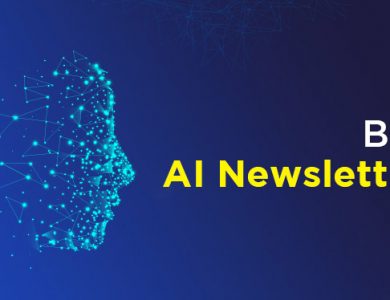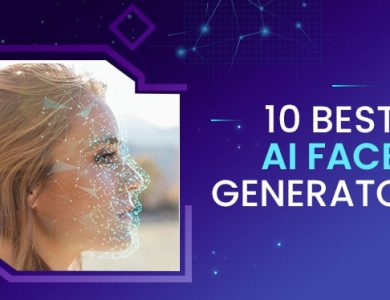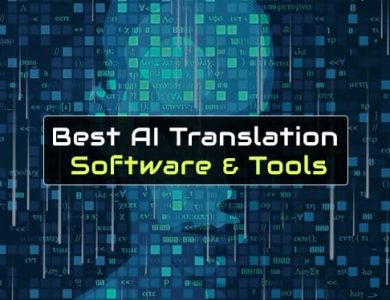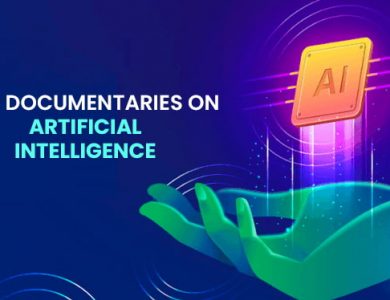Top 7 Industries That Can’t Function Without AI (With Use Cases)

Within the dynamic tapestry of our technological landscape, an extraordinary force has emerged, reshaping the very essence of countless industries. Its name resounds with echoes of innovation, disruption, and boundless possibilities: Artificial Intelligence.
Welcome, dear reader, to the realm of AI, where the convergence of machine intelligence and human ingenuity has birthed a revolution that transcends the boundaries of work, life, and interaction. Today, we embark on an exploration, delving into the 7 industries that have become irrevocably intertwined with the transformative power of AI.
From the intricacies of healthcare to the complexities of finance, from the vast networks of transportation to the bustling aisles of retail, AI has become the lifeblood that fuels progress and propels industries to soaring heights.
This blog will dive deep into the inner workings of these sectors, uncovering the use cases that showcase AI’s indispensable role in their functioning.
Table of Contents
Healthcare Industry

The healthcare industry plays a pivotal role in our lives, focusing on the well-being and treatment of individuals. With the integration of AI, this industry has experienced a significant transformation by enabling early disease detection, assisting in accurate diagnoses, optimizing treatment plans, and enhancing patient care.
Use-cases of AI in the Healthcare Industry
1.Medical Imaging and Diagnostics
Medical imaging and diagnostics have undergone a remarkable transformation through the advent of AI, ushering in an era of unprecedented advancements in the analysis and interpretation of intricate scans. With ML algorithms, medical images such as X-rays, CT scans, and MRIs are swiftly scrutinized, providing invaluable assistance to radiologists in their quest to detect and diagnose conditions.
These algorithms possess the remarkable ability to discern intricate patterns that may indicate abnormalities. This capability helps in the early detection of diseases such as cancer, cardiovascular issues, and neurological disorders. Consequently, the integration of AI expedites the diagnosis process, significantly reduces errors, and optimizes treatment planning, thereby ushering in a new era where patient outcomes are dramatically improved.
2.Drug Discovery and Development
In the past, the drug discovery and development process was known for its arduous and expensive nature. However, we now witness a transformative shift. AI algorithms possess the ability to meticulously sift through vast volumes of biomedical data, scientific literature, and genetic information.
This groundbreaking technology swiftly narrows the selection process, sparing valuable time and resources, which in turn, has the potential to redefine the landscape of disease treatment, paving the way for revolutionary advancements in combating ailments.
3.Patient Monitoring and Care
Ingenious wearable AI devices work tirelessly to oversee vital signs, identify abnormalities, and promptly inform healthcare experts during urgent situations. These devices possess the ability to meticulously track essential factors such as heart rate, blood pressure, glucose levels, and other vital parameters.
The implementation of AI algorithms has paved the way for remote patient monitoring, enabling healthcare professionals to vigilantly observe the well-being of patients beyond the confines of conventional healthcare settings. This practice bolsters the accessibility of care by transcending geographical limitations and curbing hospital readmissions.
4.Precision Medicine and Genomics
Precision medicine has witnessed an extraordinary evolution, harnessing the inherent potential of genomics and patient data to forge customized treatment plans. Delving deep into expansive genomic databases, AI algorithms unravel the intricacies of genetic variations and their profound implications on the onset and progression of diseases.
By understanding an individual’s genetic makeup, medical history, and lifestyle choices, AI guides healthcare professionals in crafting effective treatment protocols. This approach not only amplifies the efficacy of treatments but also safeguards against adverse reactions.
5.Administrative Efficiency and Workflow Optimization
AI revolutionizes healthcare workflows by simplifying administrative duties, granting healthcare professionals respite from laborious paperwork and providing them the freedom to channel their focus toward patient well-being. Through the employment of NLP algorithms, pertinent details from patient records are extracted, automating data input and alleviating the weight of manual documentation.
Additionally, chatbots and virtual assistants provide instant patient support, promptly addressing common inquiries, organizing appointment schedules, and ensuring adherence to medication routines.
Finance and Banking Industry
 The finance and banking industry plays a critical role in the global economy. However, the domain faces various challenges, including fraud, compliance, and inefficiencies. Artificial Intelligence offers game-changing solutions to these hindrances by automating manual tasks, enhancing fraud detection, and improving risk assessment.
The finance and banking industry plays a critical role in the global economy. However, the domain faces various challenges, including fraud, compliance, and inefficiencies. Artificial Intelligence offers game-changing solutions to these hindrances by automating manual tasks, enhancing fraud detection, and improving risk assessment.
Use-cases of AI in the Finance and Banking Industry
1.Fraud Detection and Prevention
The influence of AI in combating fraud within the finance and banking domains is undeniably profound. Through the adept utilization of machine learning algorithms, copious amounts of transactional data undergo analysis, unveiling hidden patterns and promptly raising red flags for any dubious activities.
By scrutinizing transactions and user conduct, AI systems possess the ability to identify anomalies and thwart potential fraud, thereby safeguarding financial institutions and their customers. The deployment of fraud detection systems has yielded substantial reductions in financial losses and reinstated a sense of faith in the banking ecosystem.
2.Algorithmic Trading and Portfolio Management
Trading and portfolio management has witnessed a transformative shift due to algorithms that evaluate extensive financial data and market trends. Machine learning algorithms can analyze market trends, historical data, news sentiment, and other relevant factors to identify investment opportunities and optimize trading strategies.
AI-powered stock trading bots execute trades autonomously, leveraging sophisticated algorithms to capitalize on market fluctuations and minimize risks. This technology has the potential to deliver higher returns, improve portfolio management, and enhance overall investment performance.
3.Customer Service and Chatbots
In an era of instant gratification, customer service plays a vital role in financial institutions. AI-powered chatbots have transformed how banks interact with customers, providing efficient and personalized assistance 24/7. NLP algorithms enable chatbots to understand customer queries, provide relevant information, and guide them through various banking processes.
Chatbots can assist with account inquiries, transaction history, bill payments, and offer personalized financial advice. It improves customer satisfaction and frees human resources to focus on more complex customer needs.
4.Risk Assessment and Credit Scoring
Assessing creditworthiness and managing risk is critical to the finance and banking industry. AI algorithms analyze extensive financial data, including credit histories, income levels, and spending patterns, to accurately assess the creditworthiness of individuals and businesses. It enables more informed decision-making in credit underwriting, loan approvals, and risk management.
With the help of AI, financial institutions can mitigate risks, reduce default rates, and make more accurate lending decisions, ultimately strengthening the overall financial health of an organization.
5.Automated Compliance and Regulatory Reporting
Compliance with regulatory standards is a complex and time-consuming process. AI-based solutions can automate compliance tasks by analyzing vast volumes of regulatory guidelines, policies, and legal documents. These solutions can identify and extract relevant information, ensuring adherence to regulatory requirements.
AI can also streamline the preparation of regulatory reports by automating data collection, analysis, and report generation. It not only saves time and resources but also reduces the risk of non-compliance and associated penalties.
Transportation and Logistics Industry
 The transportation and logistics industry is experiencing a significant transformation with the integration of Artificial Intelligence. Technologies are revolutionizing the way goods are transported, routes are optimized, and supply chains are managed. AI-powered algorithms enable real-time tracking and monitoring of shipments, ensuring timely deliveries and minimizing delays.
The transportation and logistics industry is experiencing a significant transformation with the integration of Artificial Intelligence. Technologies are revolutionizing the way goods are transported, routes are optimized, and supply chains are managed. AI-powered algorithms enable real-time tracking and monitoring of shipments, ensuring timely deliveries and minimizing delays.
Use-cases of AI in the Transportation and Logistics Industry
1.Autonomous Vehicles and Self-Driving Technology
Self-driving vehicles are one of the most significant breakthroughs in the transportation industry, offering improved safety, reduced congestion, and enhanced mobility. Autonomous vehicle systems leverage sensors, cameras, and advanced algorithms to perceive and interpret their surroundings, making real-time decisions to navigate roads, avoid obstacles, and adhere to traffic regulations.
By diminishing the dependence on human drivers, autonomous vehicles have the potential to revolutionize public transportation, ride-hailing services, and logistics operations, steering in increased efficiency and reducing fuel consumption.
2.Route Optimization and Supply Chain Management
Efficient route planning is vital for transportation and logistics companies to minimize costs, reduce delivery times, and optimize resource utilization. AI algorithms analyze historical and real-time data on factors such as traffic conditions, weather, and order volumes to determine the most optimal shipment routes.
By considering multiple variables, AI-powered route optimization systems can generate optimal delivery schedules, streamline operations, and enhance customer satisfaction. Additionally, automated supply chain management systems enable precise demand forecasting and efficient order fulfillment, ensuring the smooth flow of goods from origin to destination.
3.Predictive Maintenance and Asset Tracking
Machine learning algorithms can predict equipment failures and perform proactive maintenance, minimizing costly downtime. By analyzing sensor data and historical maintenance records, these intelligent systems can identify patterns and indicators of potential breakdowns, enabling timely repairs or replacement of components.
Additionally, automated asset tracking systems leverage GPS, IoT devices, and data analytics to monitor and optimize the utilization of vehicles, containers, and other valuable assets, improving operational efficiency and reducing losses.
4.Intelligent Freight Brokering and Load Optimization
Fleets use new technologies to optimize loads and freight, making logistics more efficient and transparent. AI-powered platforms can match shippers with carriers based on various criteria, such as capacity, routes, and pricing. These platforms leverage data related to market trends and load assignments, ensuring that trucks operate at maximum capacity.
AI reduces costs, improves resource utilization, and enhances overall operational efficiency in the transportation and logistics industry by streamlining the freight brokerage process.
5.Intelligent Warehousing and Robotics
AI-powered systems can automate inventory management, order fulfillment, and picking and packing operations. AI-driven robots can navigate warehouse environments, identify and retrieve items, and collaborate with human workers seamlessly.
This automation improves operational efficiency, reduces errors, and enhances order accuracy and speed. Intelligent warehousing and robotics enable faster order processing and fulfillment, ultimately improving customer satisfaction.
Retail Industry
 Integrating Artificial Intelligence with the retail industry is crucial for staying competitive and meeting the ever-evolving demands of consumers. With AI-powered technologies, retailers can gain valuable insights into customer behavior and preferences, enabling targeted marketing campaigns.
Integrating Artificial Intelligence with the retail industry is crucial for staying competitive and meeting the ever-evolving demands of consumers. With AI-powered technologies, retailers can gain valuable insights into customer behavior and preferences, enabling targeted marketing campaigns.
Use-cases of AI in the Retail Industry
1.Personalized Customer Experiences
AI enables retailers to deliver personalized customer experiences with the help of data analytics and machine learning algorithms. By analyzing customer preferences, purchase history, and online behavior, AI systems can generate tailored product recommendations and offers.
Personalization extends beyond product suggestions. It includes customized marketing emails, targeted promotions, and personalized virtual shopping assistants. With the utmost focus on individual customer needs and preferences, retailers can enhance customer satisfaction, drive engagement, and increase sales.
2.Inventory Management and Demand Forecasting
Accurate inventory management is critical for retail success, and AI-powered systems excel in optimizing stock levels and demand forecasting. These algorithms can examine sales data and external factors to predict future demand patterns. It allows retailers to maintain optimal inventory levels, minimize out-of-stock situations, and reduce excess inventory.
Retailers can also automate their replenishment process, generate purchase orders, and optimize supply chain operations, ultimately leading to cost savings and improved customer satisfaction.
3.Visual Search and Augmented Reality
Visual search technology uses image recognition algorithms to enable customers to search for items by uploading images or using photos from social media. This technology allows customers to find visually similar products, reducing the time-consuming process of keyword searching.
AR enables customers to try on clothing virtually, visualize furniture in their homes, and experience products in a digital environment. These AI-driven technologies enhance engagement, reduce return rates, and provide customers with a more immersive and personalized shopping experience.
4.Dynamic Pricing and Competitive Intelligence
Dynamic pricing algorithms empower retailers to optimize their pricing strategies. By analyzing market conditions, competitor pricing, customer behavior, and demand trends, AI algorithms can automatically adjust prices to maximize profitability.
It helps retailers remain competitive, attract customers, and adapt to changing market dynamics. Furthermore, competitive intelligence enables retailers to gather insights into competitors’ pricing strategies, promotional activities, and product assortments, allowing them to make informed business decisions.
5.Fraud Detection and Loss Prevention
Fraud and theft are two substantial challenges within the retail industry. By incorporating the power of AI retailers can analyze transactional data, customer behavior, and patterns to identify fraudulent activities.
These automated systems can also monitor in-store activities, using computer vision and video analytics to detect suspicious behavior, shoplifting, and organized retail crime. With AI, retailers can proactively prevent fraud, reduce financial losses, and create a safer shopping environment for customers.
Manufacturing Industry
 The manufacturing industry is experiencing a paradigm shift with the integration of Artificial Intelligence, reshaping how operations are conducted. AI technologies, such as predictive maintenance, quality control systems, and collaborative robots, drive manufacturing efficiency, productivity, and quality.
The manufacturing industry is experiencing a paradigm shift with the integration of Artificial Intelligence, reshaping how operations are conducted. AI technologies, such as predictive maintenance, quality control systems, and collaborative robots, drive manufacturing efficiency, productivity, and quality.
Use-cases of AI in the Manufacturing Industry
1.Predictive Maintenance and Equipment Optimization
Machine learning algorithms and real-time sensor data helps manufacturers in implementing predictive maintenance strategies to optimize equipment performance and minimize unplanned downtime. AI systems can detect patterns, identify potential equipment failures, and schedule maintenance before breakdowns occur.
The proactive approach to maintenance enhances operational efficiency, reduces maintenance costs, and maximizes the lifespan of critical machinery, ultimately leading to higher production output and improved product quality.
2.Quality Control and Defect Detection
New technologies are capable of analyzing gigantic volumes of data, including product specifications, sensor data, and historical defect patterns, to identify and classify defects with high accuracy.
With the help of these machine learning algorithms, one can identify anomalies, classify defects, and trigger real-time alerts for corrective action. This automated process enhances product quality, reduces waste, and ensures compliance with stringent quality standards.
3.Supply Chain Optimization and Demand Forecasting
Supply chain optimization algorithms driven by advanced technology empower manufacturers to enhance operational efficiency and fulfill customer demands with precision. They optimize inventory levels, procurement processes, and production schedules by diligently analyzing data from diverse sources, encompassing sales forecasts and supplier information.
The prowess of demand forecasting, fueled by AI, equips manufacturers with the ability to anticipate market fluctuations, adapt production accordingly, and minimize the financial burden of excess inventory.
4.Collaborative Robots and Automation
Collaborative robots, aptly named cobots, have revolutionized the manufacturing industry through their integration with human operators. These machines effortlessly shoulder the burden of repetitive and physically strenuous tasks, delivering heightened productivity levels and efficiency.
Cobots adjust to dynamic surroundings, interact harmoniously with human counterparts, and glean insights from their encounters. By automating mundane duties, cobots elevate the pace of production, enhance worker well-being, and liberate human operators to concentrate on value-driven endeavors.
5.Smart Manufacturing and Data Analytics
AI facilitates the implementation of smart manufacturing systems, where machines, sensors, and processes are interconnected to optimize performance. AI-powered data analytics platforms analyze vast amounts of data from devices, sensors, and production lines, extracting actionable insights to improve efficiency and productivity.
These systems can identify bottlenecks, optimize workflows, and make real-time adjustments to maximize output and minimize waste. The AI-powered manufacturing systems enable manufacturers to achieve greater agility, flexibility, and responsiveness to market demands.
Education Industry
 AI is reshaping the education industry by altering how students learn, teachers instruct, and educational institutions operate. Predictive analytics enable effective education management by predicting student outcomes and optimizing resource allocation.
AI is reshaping the education industry by altering how students learn, teachers instruct, and educational institutions operate. Predictive analytics enable effective education management by predicting student outcomes and optimizing resource allocation.
By embracing AI-driven solutions, this industry can deliver high-quality education, cater to individual learner needs, and prepare students for the challenges of the future.
Use-cases of AI in the Education Industry
1.Personalized Learning and Adaptive Tutoring
Personalized learning experiences tailor educational content and instruction to every student’s unique needs and learning styles. AI-powered adaptive tutoring systems analyze student performance, learning patterns, and knowledge gaps to provide personalized recommendations and interventions.
These systems can dynamically adjust the pace, difficulty level, and content delivery, ensuring that students receive targeted support and maximize their learning outcomes.
2.Intelligent Content Creation and Curation
AI facilitates the creation and curation of educational content, empowering educators to deliver engaging and relevant materials. Natural Language Processing (NLP) algorithms can generate interactive lessons, quizzes, and assessments, while content curation platforms leverage AI to curate and recommend educational resources from a vast pool of digital content.
Content creation and curation, with the help of AI, can enhance instructional effectiveness, save educators time, and promote collaborative and interactive learning experiences.
3.Automated Grading and Feedback
Automated grading and feedback processes alleviate the burden on educators and provide timely feedback to students. Advanced algorithms can automatically assess objective assignments, such as multiple-choice tests, and provide instant feedback.
Natural Language Processing algorithms enable automated grading of subjective assignments, such as essays, by analyzing writing quality, coherence, and content. Automated grading and feedback enhance efficiency, ensure consistency, and accelerate the learning and improvement process.
4.Intelligent Student Support and Counseling
AI-driven student support systems assist learners in accessing resources, providing guidance, and addressing their academic and emotional needs. AI-powered chatbots and virtual assistants can answer student queries, offer study tips, and provide information on courses and programs.
These systems can also analyze student behavior, sentiment, and engagement patterns to identify students requiring additional support or intervention. Intelligent student support and counseling systems foster student success, well-being, and engagement.
5.Predictive Analytics for Education Management
Educational institutions leverage predictive analytics for effective management and decision-making. AI algorithms predict student outcomes, identify at-risk students, and recommend appropriate interventions by analyzing student data, performance trends, and demographic factors.
Predictive analytics also aid in resource allocation, course planning, and enrollment management, enabling educational institutions to optimize their operations and resources effectively.
Entertainment and Media Industry
 AI is reshaping the Entertainment and Media industry, revolutionizing content creation, distribution, and audience engagement. With AI-powered recommendation systems, personalized content delivery has become the norm, ensuring users discover and engage with content tailored to their preferences.
AI is reshaping the Entertainment and Media industry, revolutionizing content creation, distribution, and audience engagement. With AI-powered recommendation systems, personalized content delivery has become the norm, ensuring users discover and engage with content tailored to their preferences.
The transformative impact that AI has in the Entertainment and Media industry opens up new frontiers, creating immersive experiences, enhancing audience engagement, and shaping the future of entertainment.
Use-cases of AI in the Entertainment and Media Industry
1.Content Recommendation and Personalization
Recommendation systems have become integral to the entertainment industry, helping users discover content that aligns with their preferences. AI algorithms can deliver personalized recommendations across various media platforms by analyzing user behavior, viewing patterns, and demographic data.
It enhances user engagement, increases content consumption, and fosters a more tailored immersive entertainment experience.
2.Virtual Reality (VR) and Augmented Reality (AR) Experiences
AI is vital in enhancing virtual and augmented reality experiences and creating interactive content for users. AI algorithms enable realistic simulations, spatial recognition, and object tracking in VR and AR environments.
This technology enhances gaming experiences, enables virtual tours, and enables users to interact with digital content in real-world settings, opening up new possibilities for storytelling and entertainment.
3.Content Generation and Automation
The transformation of the content creation process in the entertainment industry due to AI is profound. Natural Language Processing algorithms can generate scripts, captions, and subtitles, saving time and effort for content producers.
Video editing tools can automate repetitive tasks, including scene clipping and segmentation. This automation streamlines content production, accelerates time-to-market, and empowers creators to focus on ideation and storytelling.
4.Audience Analysis and Engagement
Entertainment companies need to gain valuable insights into audience preferences and behaviors to stay on top of their A-game. AI algorithms can identify trends, gauge audience reactions, and inform content strategies by analyzing social media data, sentiment analysis, and engagement metrics.
This data-driven approach enhances audience engagement, enables targeted marketing campaigns, and facilitates the creation of content that resonates with viewers.
5.Copyright Protection and Piracy Prevention
Implementing new technologies are significant in protecting intellectual property rights and combating content piracy in the entertainment industry. AI algorithms can analyze and compare vast amounts of digital content, identifying copyright infringements and unauthorized distribution.
Through content recognition and digital watermarking, AI-powered systems can detect and prevent unauthorized sharing and distribution, safeguarding the interests of content creators and rights holders.
The Road Ahead
Artificial Intelligence is rapidly transforming industries across the board, and its impact on sectors such as healthcare and finance to education and entertainment is truly eye-opening.
The future of AI in these sectors holds immense potential for innovation, efficiency, and improved outcomes. The use cases in this blog only scratch the surface of AI’s potential.
As technology continues to advance, we can expect even more transformative applications in various sectors, driving progress and shaping a future where AI plays a central role in our everyday lives.



